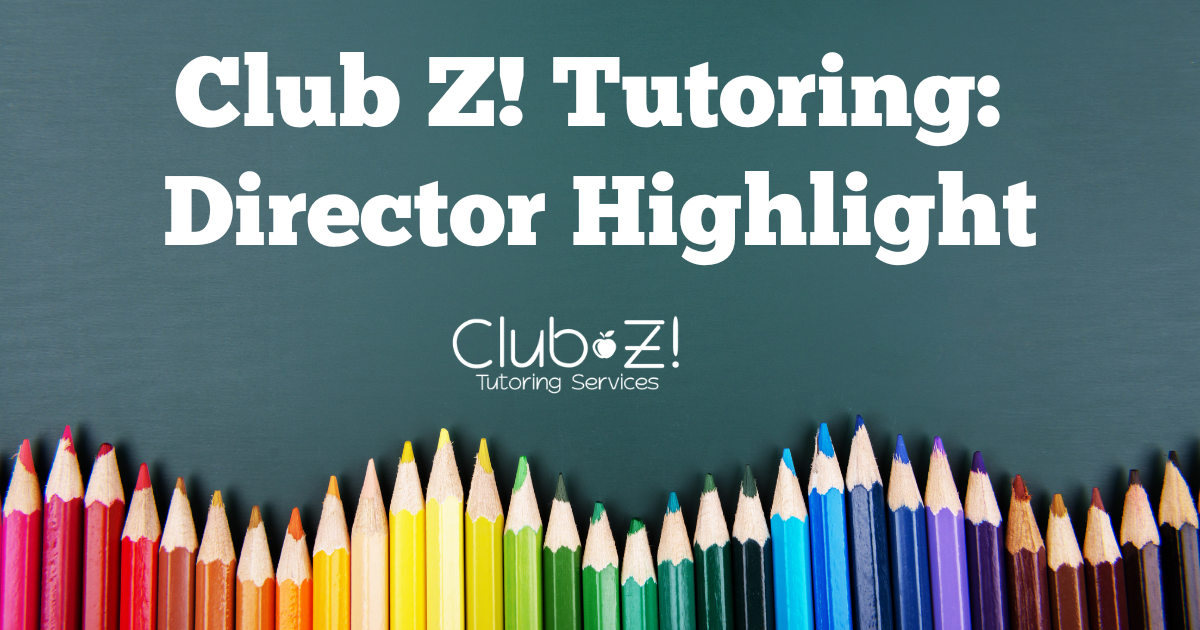Blending Psychology and Personalized Learning: A Director’s Journey with Club Z! Tutoring
 At Club Z! Tutoring, we know the impact of one-on-one instruction goes far beyond grades. It shapes confidence, learning habits, and a lifelong love of learning. To better understand how we foster that transformation, we spoke with one of our passionate Club Z! directors, Lisa Vivo, a licensed school psychologist with over a decade of experience supporting students with learning differences.
At Club Z! Tutoring, we know the impact of one-on-one instruction goes far beyond grades. It shapes confidence, learning habits, and a lifelong love of learning. To better understand how we foster that transformation, we spoke with one of our passionate Club Z! directors, Lisa Vivo, a licensed school psychologist with over a decade of experience supporting students with learning differences.
In this Q&A, she shares her journey, insights, and how psychology and personalized tutoring combine to create powerful outcomes for students.
What inspired you to become a director at Club Z! Tutoring?
The effective tutoring model. One on one instruction in the home where a student is comfortable and has all of their materials WORKS. Especially with the quality level of our tutors. I also saw how great the company/corporate was as a whole when I worked for their sales support center while in college.
Can you tell us about your professional background before joining Club Z!?
I am a licensed school psychologist. I practiced in public and charter schools for over a decade, and I helped students with learning differences.
How does your background influence the way you run your Club Z! Center?
I approach academic growth from a team perspective. The tutor, the parents, the student, and I — we each have a role to play to see that student meet their goals.
How do you use your psychology training to assess student needs and learning styles?
I rely heavily on teacher and parent input. They know their students best. I consult with tutors along the way to further learn more about the student and guide their approach when needed.
Do you approach academic struggles differently because of your psychology background?
Yes, because I know that learning is affected by so many factors like memory, executive functioning, motivation, background knowledge, attention skills, classroom and home environment, teacher/tutor relationship. The list goes on and on. We have control over some of those factors and that is what we focus on.
How do you ensure tutoring supports emotional well-being as well as academics?
We infuse study habits into sessions so that students build independence, and along with that, self-confidence. I am also focused on the tutor and student match to make sure I get it right the first time and we can provide that student with a consistent tutor. This allows them to build a rapport and improves outcomes.
What unique perspective do you bring when speaking with parents about academic challenges?
Children love to learn and feel accomplished, but they must feel safe and supported when doing so.
Have you worked with students who have IEPs, 504 plans, or learning disabilities? How does Club Z! meet those needs?
Yes, I have. The personalized approach that we have is what they need. I have these students working with top tutors to ensure they get high quality instruction that meets their needs.
How do you bridge the gap between home, school, and tutoring for students with complex needs?
We connect with teachers and parents to help guide our instruction and determine goals. I check in frequently with the parents and tutor and offer guidance when needed.
Do you provide specific insights or tools from your psychology experience to tutors?
I highlight the importance of relationship building since it improves learning outcomes.
What types of student transformations are most meaningful to you?
I’ve seen students go from failing courses and feeling little confidence to earning A’s and deeply understanding concepts. Seeing students, teachers, parents, and tutors share how proud they are makes my day.
How do you define student success beyond grades and test scores?
Confidence and concept mastery. When a student starts loving a subject they once hated, that’s success.
What can tutoring companies learn from school psychology practices?
That one size does not fit all. Every child is different, and learning plans should reflect that.
How do you envision the future of supplemental education for students with special needs or anxiety around learning?
Being matched with a tutor that has the personality and expertise that will facilitate their development.
What role do you believe tutoring plays in a child’s overall development?
Tutoring is a great resource to have in every parent toolbelt. It can help development in so many areas, especially our personalized approach. It can help struggling learners and it can also help students get far ahead.
What’s most rewarding about combining psychology with entrepreneurship?
I love empathizing with families and finding creative, personalized solutions to their challenges. It’s incredibly fulfilling work.
If you could tell parents one thing about supporting their child’s learning journey, what would it be?
Don’t sleep on tutoring! It can be the most powerful confidence booster and one of the best investments you make in your child’s future.
Conclusion: A Holistic Approach to Tutoring That Works
At Club Z! Tutoring, we’re proud to have directors and tutors who go beyond textbooks. People who understand the emotional, psychological, and academic sides of learning. Whether your child is struggling or striving for excellence, our personalized, one-on-one approach can make all the difference.
Interested in becoming a Club Z! franchise owner? Call one of our franchise developers today at 866-658-8978 or visit our tutoring franchise opportunities page to inquire about our current offers and available franchise opportunities!

 Club Z! News
Club Z! News
- New Year, Better Grades: How Club Z! Tutoring Helps Students Succeed
- Partners in Education: How Two Club Z! Tutoring Directors Serve Families Together
- Navigating Homework Challenges: A Tutor’s Guide for Parents
- How Tutoring Can Foster a Love for Reading in Children
- Blending Psychology and Personalized Learning: A Director’s Journey with Club Z! Tutoring
- Back to School Season with Club Z! Tutoring: Tips, Tools, and Support for a Strong Start
- Making an Impact: A Club Z! Tutoring Director’s Journey of Community, Compassion, and Student Success
- Study Tools and Apps: Enhancing the Tutoring Experience
- The Impact of Social Emotional Learning in Tutoring Sessions
- Building Strong Foundations: Tutoring for Elementary School Students
 CATEGORIES
CATEGORIES
- ACT (2)
- Club Z! Tutoring (77)
- College Admission Requirements (86)
- Franchise Spotlights (1)
- Press Release (3)
- SAT (2)
 RECENT POSTS
RECENT POSTS
No matter how you look at it, college is an expensive proposition these days. Both public and private colleges and universities have had to raise fees and tuition as costs have increased. As a result, college student debt has skyrocketed and many students end up with loan payments years, sometimes even decades, after graduation. But with some careful planning and creative thinking, there are lots of other ways to help pay for college and avoid being stuck with big loan payments after graduation. One final but important step in the college application process is to include an application for financial aid.
As parents, and grandparents for that matter, we consider it to be a bit of a rite of passage to tell our children just how easy they have it compared to what we went through at their age. File this under the “when I was your age, I had to walk 2 miles to school each day, uphill both ways” category.
For any parent of a college-bound student, SAT and ACT test scores are no doubt at the center of most dinner table discussions. While no one will argue that test scores alone are the deciding factor in college admissions, and many colleges are moving toward a test-optional admissions policy, strong scores on the SAT and or ACT can definitely help a student’s chance of gaining admission to his/her college of choice.


 Emily Novoa
Emily Novoa  July 29 ,
2025
July 29 ,
2025  0 Comments
0 Comments

